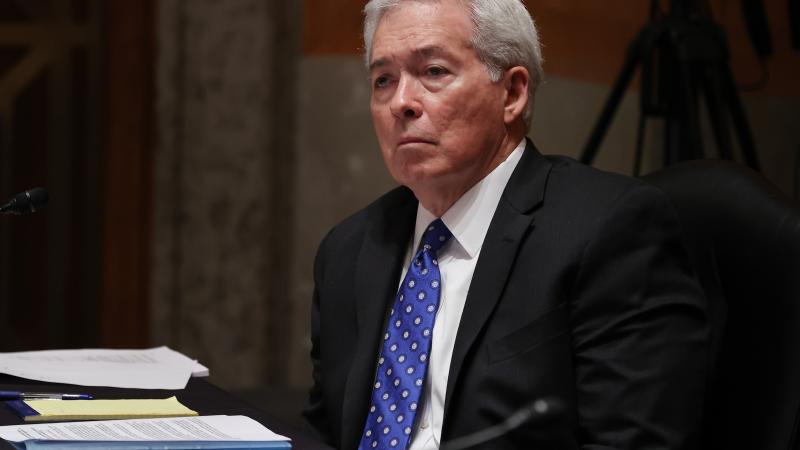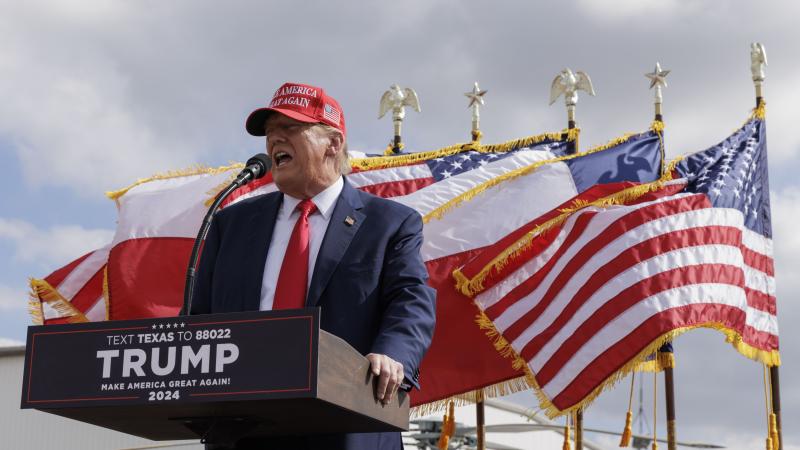New House GOP majority eyes select committee to push back against China threat
Republicans seek bipartisan cooperation in campaign to combat Beijing's influence on a range of fronts, from Taiwan to Tik Tok.
House Republicans are ramping up ambitious investigative and legislative plans for addressing America's growing rivalry with China — and it may be one of the few areas where they find some support from Democrats.
"The Chinese Communist Party is our greatest generational threat and will be a top national security priority this Congress," Rep. Michael McCaul (R-Texas) told Just the News on Tuesday, when Republicans officially took control of the House as a new Congress was sworn in.
McCaul, the incoming chairman of the House Foreign Affairs Committee, will be one of the leaders driving a congressional campaign to combat Chinese influence, a key piece of House Republicans' agenda.
Part of this agenda was outlined Friday by newly minted House Majority Leader Steve Scalise (R-La.), who sent his Republican colleagues a letter detailing specific legislation scheduled to be brought to the House floor over the next two weeks. The list includes a measure to establish the Select Committee on the Strategic Competition Between the United States and the Chinese Communist Party, a bipartisan body to be chaired by Rep. Mike Gallagher (R-Wisc.).
"The greatest threat to the United States is the Chinese Communist Party," Gallagher said in a statement last month. "The CCP continues to commit genocide, obscure the origins of the coronavirus pandemic, steal hundreds of billions of dollars' worth of American intellectual property, and threaten Taiwan. The Select Committee on China will push back in bipartisan fashion before it's too late. Even in divided government, we have an opportunity to build a united front against CCP aggression."
In recent op-eds and interviews, Gallagher has laid out how the committee — and House Republicans more generally — will adopt a comprehensive approach to China encompassing a range of issues, including U.S. investments in China and U.S. dependence on China for various goods, such as pharmaceuticals and critical technology.
Another issue to be tackled by the House GOP is energy. According to Scalise's letter, Republicans will push a bill prohibiting the secretary of energy from sending petroleum products from the Strategic Petroleum Reserve to China.
The Biden administration came under scrutiny this year for draining the country's emergency oil reserves to their lowest level since 1984 in a bid to counter soaring gas prices amid a global supply shortage.
House Republicans have also said they plan to investigate how President Biden's green energy agenda to transition from fossil fuels to renewables may benefit China.
"Since day one, President Biden has been giving China a pass," Rep. Cathy McMorris Rodgers (R-Wash.), the new chair of the Energy and Commerce Committee, told Fox News Digital. "This administration knows that their radical rush-to-green agenda is making us dangerously dependent on Chinese supply chains, yet they continue to advocate for these policies. Energy and Commerce Republicans will be leading on robust oversight into how the Biden administration's war on American energy is jeopardizing our energy and national security."
Another issue on the agenda is food, with Rep. Dusty Johnson (R-S.D.) hoping to find momentum for his bill prohibiting Chinese purchases of agricultural processing facilities in the U.S.
"This is not just some sort of manufactured Boogeyman," he told the Argus Leader. "This is part of a planful and deliberate strategic strategy by the Chinese Communist Party to gain more control over the global food supply."
Johnson drew a parallel to the ongoing energy crisis in Europe, which has long been reliant on Russia for energy.
"We are seeing a bipartisan awareness of the fact that we cannot let China have the same control over food that Europe allowed Russia to have over energy," said Johnson.
In the fall, Johnson introduced legislation to ban the social media app TikTok from federal government devices. The measure was just signed into law last week as part of the omnibus bill that provides $1.7 trillion for government funding.
Expanding the TikTok ban is likely to become a key issue this Congress. Several members of Congress have called for an outright nationwide TikTok ban, including Gallagher, who's cosponsored such legislation.
TikTok is owned by ByteDance, a Chinese company. U.S. officials have expressed concern about the prospect of the app's extensive data harvesting being accessible to the Chinese government.
Beyond Tik Tok, Republicans are expected — and being pushed by policy experts and some tech leaders, including venture capitalist Peter Thiel — to investigate China's theft of U.S. intellectual property and relationship with Big Tech companies. U.S. officials have said Chinese espionage costs the U.S. upwards of $600 billion a year in stolen intellectual property.
Other China-related investigations expected to be on the House GOP agenda are probes into the origins of COVID-19 and Hunter Biden's overseas business dealings — two politically sensitive issues that Republican lawmakers have long been outspoken on and have said will be pursued over the next two years.
Perhaps most consequential, House Republicans seem poised to advocate policies supportive of Taiwan, which China considers a rogue province that must be united with the Chinese mainland — by force if necessary.
"The Select Committee [on China] will make the urgent case for aiding Taiwan in its self-defense and build relationships with our other Indo-Pacific allies," wrote Gallagher and Rep. Kevin McCarthy (R-Calif.), who hopes to be elected House speaker this week, in a recent op-ed.
McCarthy has said he'll travel to Taiwan if elected speaker — a move that would anger China and follow in the footsteps of Rep. Nancy Pelosi (D-Calif.), who made the trip to the self-governing island democracy last year.
"From the standpoint of values, security, China poses a challenge to us," Pelosi told reporters last month. "It has been one of my issues since I came here, but especially since [the] Tiananmen Square" massacre in 1989.
Pelosi's comments and visit to Taiwan — made against the wishes of Biden — highlight the fact that standing up to China is one issue on which Democrats and Republicans find much common ground.
"Despite the partisan rancor that often characterizes congressional debate," Rep. Ami Bera (D-Calif.) told the Wire China, "there is significant bipartisan consensus on the challenges posed by an increasingly authoritarian and aggressive People's Republic of China."
Gallagher has expressed hope that his committee won't be riven by typical Washington partisanship.
"We want this to be a bipartisan effort," Gallagher said in a recent interview. "We want the Democrats to nominate serious, sober people to participate, because defending America from Chinese Communist Party aggression should not be a partisan thing."
Democrats refused to participate in the committee's predecessor, the China Task Force.
With a narrow majority in the House and a minority position in the Senate, Republicans will need Democrat support to pass their China agenda. But while bipartisanship may be possible on this issue, there's also the president to consider.
"This administration is failing to take the threat of the Chinese Communist Party seriously," McCaul told Just the News.
It remains to be seen whether he, Gallagher, and the White House will be able to get on the same page when it comes to China policy.
















